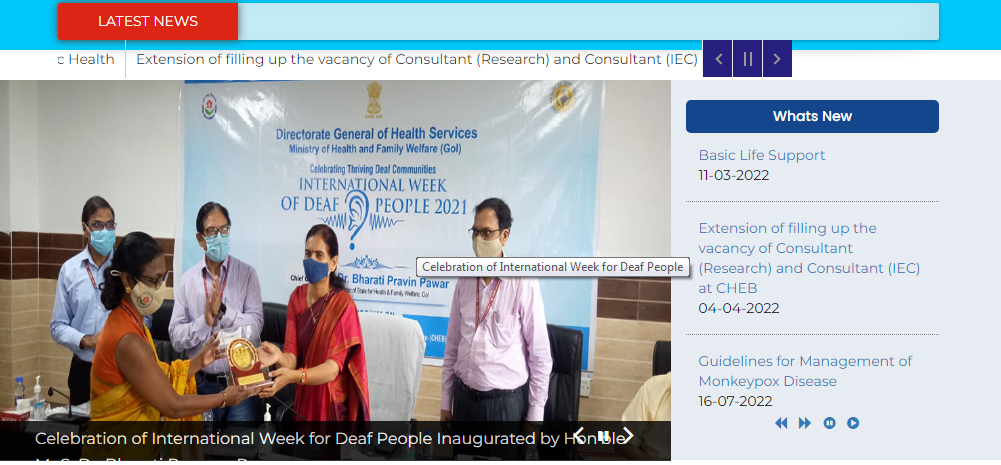
Central Health Education Bureau, New Delhi
About us
In consonance with the recommendations of the Bhore Committee and the Planning Commission, the Central Health Education Bureau (C.H.E.B.) was created in the year 1956. The publicity Unit of the Directorate General of Health Services which has existed for several years before, was merged with this newly created institute. The Bureau which started with one unit and few staff members in 1956 grew in size and activities gradually and had seven Divisions with trained technical personnel and one administrative division.
The goals and objectives of the division include educating the people about health plans and programmes, training health professionals, developing and supplying health education/IEC materials, conducting health behavioural research activities, providing technical assistance to government and non-government agencies in the field of health education, developing health education syllabi for different target groups and collaborating with international agencies in promoting health education. CHEB also works with SHEB, WHO, State health directorate, Depts. of education, NCERT, Board of Secondary Education and other national and international agencies in imparting health education.
Objective
In order to achieve the goal of developing and promoting health education in the country, the CHEB has the following objectives:-
1. Interpret the plans, programmes and achievements of the Ministry of Health and Family Welfare
2. Design guide and conduct research in health behaviour, health education processes and aids.
3. Produce and distribute type health education material in relation to various health problems and programmes.
4. Train key health and community welfare workers in health education and research methods, evolve effective methodology and tools of training.
5. Help schools and teacher training institutes for health education of the school population.
6. Provide guidelines for the organizational set-up and functioning of health education units at the state, district and other levels.
7. Render technical help to official and non-official agencies engaged in health education work and coordinate their programmes.
8. Collaborate with international agencies in promoting health education activities.
Central Health Education Bureau
Directorate General of Health Services Ministry of Health and Family Welfare Government of India
5, Kotla Road, Near Mata Sundri College, New Delhi-110002, India +91-11-23235867
+91-11-23235867 +91-11-23235867 dir[dot]cheb[at]nic[dot]in www.cheb.nic.in
Diploma in Health Education
All India Institute of Hygiene & Public Health, Kolkata
A Diploma in Health Education is a program designed to equip individuals with the knowledge and skills necessary to educate others about health-related topics. This field plays a crucial role in promoting health and wellness, preventing diseases, and fostering healthy behaviors within communities. Here are some key aspects related to a Diploma in Health Education:
Program Duration: The duration of a diploma program in health education can vary, but it is typically a short-term program that may last from a few months to a year.
Eligibility Criteria: Eligibility criteria for enrolling in a Diploma in Health Education program may vary by institution, but many programs require a minimum educational qualification, such as a high school diploma or an equivalent.
Curriculum: The curriculum of a health education diploma program covers a range of topics related to public health, health promotion, communication strategies, behavioral change theories, and program planning and evaluation. Students may study topics such as nutrition education, sexual health education, substance abuse prevention, and community health.
Practical Training: Many health education diploma programs include practical training components, such as internships, fieldwork, or community outreach projects. This hands-on experience allows students to apply theoretical knowledge in real-world settings and develop effective communication and teaching skills.
Health Education Settings: Graduates with a Diploma in Health Education can work in various settings, including schools, community organizations, healthcare facilities, non-profit organizations, and government agencies. They may be involved in developing health education programs, conducting workshops, creating educational materials, and promoting healthy lifestyles.
Career Opportunities: Career opportunities for individuals with a diploma in health education may include roles such as health educator, community health worker, public health educator, school health coordinator, or wellness program coordinator.
Professional Development: Continuing education and staying updated on current health trends and research are important for health educators. Some individuals may choose to pursue further education, such as a Bachelor's or Master's degree in Public Health or Health Education, to advance their career and take on leadership roles.
Accreditation: It's important to ensure that the institution offering the diploma program is accredited and recognized. Accreditation ensures that the program meets certain quality standards and is recognized by employers and the field of public health.
A diploma in health education provides a foundation for individuals who are passionate about promoting health and well-being in communities. Developing effective communication skills, cultural competency, and an understanding of health disparities are key components of a successful career in health education.
- Log in to post comments
- 188 views
